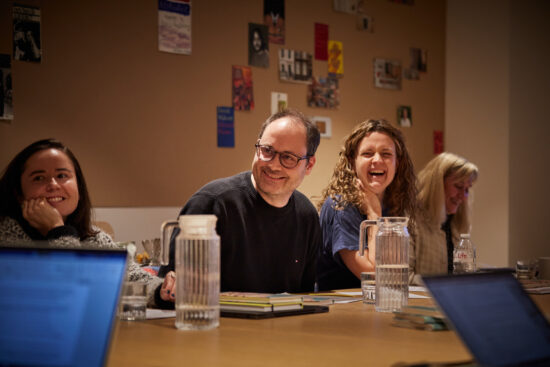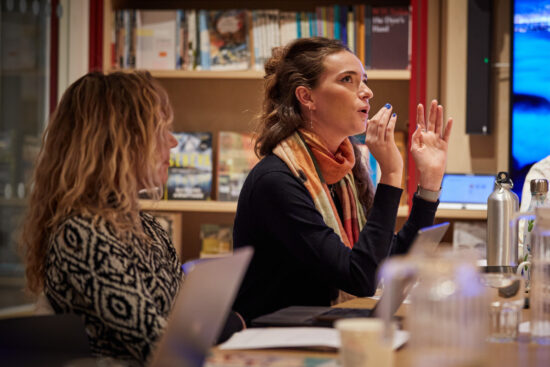Alumni Interview: Kingsley Pearson
10 minutes read
We caught up with Kingsley Pearson, author of Flat 401 and a graduate of Faber Academy’s Kickstart Your Novel course, to discuss his writing journey, how his background as a clinical psychologist informs his writing and his top tips for maintaining tension in a narrative.
You previously studied on our Kickstart Your Novel course. How valuable was the course to the writing of your novel?
Incredibly valuable. I came to the course with the seed of an idea and some early chapters, but little knowledge about how to develop it into something novel-length. The structure, exercises and feedback helped me find my voice, shape my protagonist and build a story in a way that would work for readers. It also introduced me to some good books and authors which influenced my own writing, such as Kiley Reid’s Such A Fun Age and Jane Harper’s The Lost Man (both of which have brilliant openings, of very different styles).
Did you make writing friends during your Faber Academy course? How important has peer feedback been to your process?
Yes, and I’m really grateful for that. Writing can be a solitary process, so having a supportive group to exchange work with – both on courses like Faber’s but also from peers I’ve met in other ways such as online or at crime writing festivals – helps both to develop your craft but also to motivate you. Peer feedback helps me see things I’m too close to notice, allowing me to maximise the chances of the manuscript communicating the nature of the plot and characters, and to have the emotional impact, I want it to.
Flat 401 has been described as ‘a tense, character-driven thriller.’ Could you tell us a little bit more about the novel? What gave you the inspiration for it?
Flat 401 is about Jay, a man trying to rebuild his life after being in prison for a crime he didn’t commit – while hiding the fact that he did commit a different one. When he receives a blackmail note that threatens ‘Everyone is going to know what you really did’, his already precarious life starts to unravel.
The inspiration came during the pandemic (which is when I first started writing). I felt the collective sense of being ‘shut in’ and cut off from the outside world. As a clinical psychologist, I wondered if, when it was all over, we’d feel like we’d been ‘released’ from prison. Also, I live in London, and I imagined witnessing a crime in one of the flats opposite – very Rear Window (another recommendation from a peer on the Faber course!). Those ideas, of imprisonment (literal and psychological) and voyeurism, became central to the story.
Can you share your journey to getting published?
My journey to publication (from inception to publication) took about four years.
Writing the Book:
The first draft of Flat 401 was completed over a couple of months, including the time I participated in Kickstart Your Novel.
Editing:
After completing the first draft, I embarked on several rounds of revisions. I sought feedback from peers, both from courses and also my local critique group. I spent around a day per week for a year on this part.
Querying:
I researched agents who represented psychological thrillers and tailored each query letter to the specific agent, highlighting aspects of Flat 401 that aligned with their interests. This took around nine months in total, across three batches of around a dozen queries. Between each batch, I edited the manuscript and pitch further, based on feedback received either from agents or from different competitions and prizes I also entered.
Securing Representation and Publication:
Eventually, I connected with an agent who saw the story’s potential. After signing with her, we worked together on final edits for around five months before submitting the manuscript to publishers. This collaborative effort culminated in a two-book deal with Orion. Further edits with Orion were relatively light compared to the edits I’d done up until this point (although the gap between acquisition and publication will be around a year and nine months); there was also a reasonable amount of input from me into things like cover design and marketing.
What are your top tips for maintaining tension in a narrative?
- Raise the stakes: in Flat 401, it’s very clear to the reader early on that Jay needs to get to the end of his Probation without incident, otherwise he won’t be able to move on with his life and get away from people who think they know what he did that day. The appearance of new characters and plot points serve to raise the stakes further as the story progresses.
- Keep characters in conflict: the multi-point of view (POV) approach I take allows for a sharp contrast between Jay’s motives and those of Amelia, the sister of Jay’s neighbour who died in Flat 401.
- Layer in secrets: obviously, a note that says ‘Everyone is going to know what you really did’ tells the reader that at least one person has a secret! But as we get to know the wider cast of characters, we also begin to suspect that Jay is not the only one keeping something back from the reader.
- Use setting to amplify emotional tension: I used the gritty, urban nature of the inner-city London setting of Flat 401 to magnify the claustrophobia around Jay and his feeling of needing to get away.
- Ask a central question that drives the reader, and make sure the narrative is focused on moving us towards answering this: What really happened inside Flat 401?
Could you tell us about your writing routine, and how you balance writing with other aspects of your life?
I work, so I write in the evenings, at weekends, or on days off. I’m not a 5am writer, that’s for sure! However, I also try not to write after 8pm, as that tends to affect my sleep. And I’m very lucky not to have any caring responsibilities. That said, work on my second book was a lot slower than my work on Flat 401 for example, because for one year I was in a very demanding post and also had other challenges going on outside of work.
In the face of the other demands of life we’ll all face, I find being very systematic and structured helps: breaking the writing process down into chunks like ‘Ideating’, ‘Outlining’, ‘Writing the First Draft’, and then many phases of ‘Editing’. I also believe that it’s important to have a life, and spend time, outside of writing, to recharge and to allow ideas to come to us.
Do you have any advice for aspiring authors?
Connect with other writers. Even just one or two trusted readers can make all the difference to the quality of your manuscript. And having supportive friends who understand what you’re going through and where you’re trying to get to can help you get through the tougher times of what tends to be a long journey, as well as celebrate with you and hype you up at the high points.
Do try to take on as much feedback as possible. On Kickstart Your Novel, I was told that the number of POVs I was using (6, technically 7) might be a bit ambitious for my debut. I ignored this, thinking I could handle it, and ended up reducing it to 5 with my agent anyway. According to early readers, the multi-POV approach works well, but now I’m writing my second book, which has only 3 POVs, I can see that the smaller number gives me greater control over voice and narrative.
What are you reading right now?
I’m reading or have just finished books by other authors on my first panels as a published author at CrimeFest in Bristol (May 2025 – the final one!). Lucy Andrew’s A Very Vexing Murder, Roger Corke’s Deadly Protocol, Chris Curran’s When The Lights Go Out, CM Ewan’s Strangers in the Car, MA Hunter’s The Woman on Platform 8, Christie Newport’s The Raven’s Mark (OK, luckily I’d already read that one), and Lynne Marie Taylor’s Death in Valletta.
What was the most challenging part of writing this book?
Honestly, one of the biggest challenges wasn’t writing the book itself (in a ‘pure’ sense): it was shaping the manuscript to meet the expectations of the publishing industry. I’d come from a clinical and reader background, so learning how to make my story ‘fit’ within the conventions of the psychological thriller genre – while still staying true to the emotional and thematic core I wanted to explore – was a challenge.
I had to figure out my approach to things like: what makes something feel ‘commercial’ or ‘upmarket’? How far am I prepared to change, for example, swear words or expressions of sexuality to make it more palatable to a general audience? There were times when I worried that my book was too character-driven (particularly by minority characters) or too emotionally intense (as a clinical psychologist, I have a higher threshold than most for negative emotions!) for the market. The challenge became about finding that balance: staying authentic to the story I wanted to tell, while also making it readable, structured, and satisfying for a broader audience.
Getting feedback – from peers, tutors, and later, my agent and editor – help me bridge that gap between what I’d written and what the market was looking for. It took many drafts (and a lot of knowing which hills I was prepared to die on, and which I was not), but ultimately I’m proud of how the book ended up.
Quotes from authors (for the cover) suggest that I managed to strike that balance between a compelling, accessible story that is still emotionally resonant and explores deeper issues. I’m looking forward to seeing how it lands with wider readers in July 2025!
What’s next for your writing?
I’m working on my second novel. This is another psychological suspense but set on the Isle of Wight, so uses a more rural setting to enhance the sense of isolation and threat the protagonist feels. Without spoiler-ising either book, it has some of the same themes/motivation as Flat 401 but from a different angle. I hope that I am continuing to learn and grow as a writer, and that this will be reflected in Book 2!
Kingsley Pearson is a crime/thriller writer whose work has been shortlisted for several pre-publication prizes. He aims to tell compelling stories that move the reader, speak to them at a deeper level, and leave them with something to take away and talk about. He is a mixed-race British gay man who works as clinical psychologist specialising in digital mental health tools.
How do we ignite the spark of a story to fire up a fully-realised novel? What are the key decisions we need to consider when writing long form prose fiction? Kickstart Your Novel will dive into story-telling possibilities and explore the ‘big picture’ questions all novelists need to know, equipping writers with extensive knowledge of novel writing techniques and the confidence to get that book started.
You’ll finish the course with a compelling opening chapter that signposts the onward direction of travel in the world of their story, plus a practical ‘road map’ to achieve their individual goal. Find out more.
End





